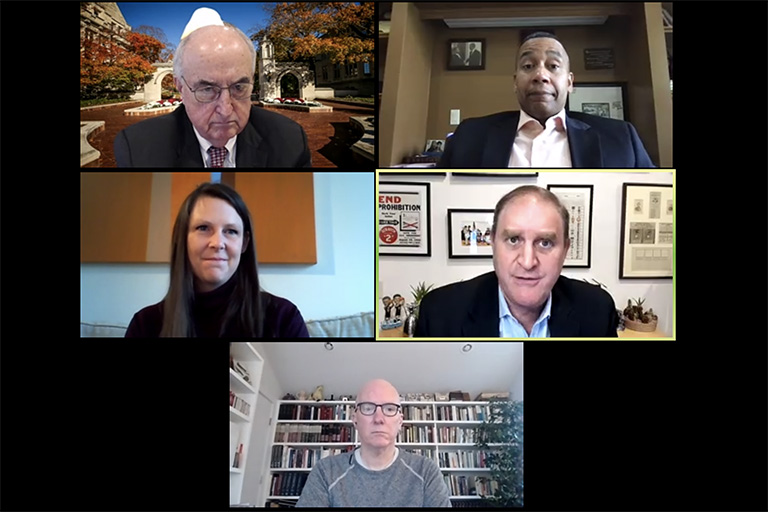Despite a global pandemic and serious concerns about election security, including foreign interference in the 2016 presidential election, state and local election officials were able to pull off the 2020 election without some of the major disruptions many feared. Indiana University President Michael A. McRobbie moderated a virtual panel discussion Dec. 14 -- hosted by the American Association for the Advancement of Science and the National Academies of Sciences, Engineering and Medicine -- that focused on lessons the country can take away from the 2020 election.
The panel discussion featured four of the nation’s leading authorities on election security, three of whom served with McRobbie on NASEM's nonpartisan Committee on the Future of Voting, which released a detailed report in 2018 that included recommendations for improving the United States' election security. The committee's report laid the foundation for the virtual discussion, which took place while electors met in their respective states and the District of Columbia to record their votes as part of the Electoral College process.
McRobbie started the discussion by asking about the record voter turnout and its implications for future elections. More Americans voted in the November election than ever before, and two-thirds of the voting eligible population voted – the highest percentage in any election in 120 years.
"The record turnout is a function of all the different motivations that were leading people to vote," said Nate Persily, James B. McClatchy Professor of Law at Stanford University. "People were interested, people were concerned about the future of the country."
McRobbie then turned the panelists’ attention to voting-by-mail and the record numbers of people who utilized mail-in ballots during the election, despite baseless claims about their legitimacy.
"It's been the focus of some of the most strident questioning of the election, in spite of what seems to be a complete absence of fraud or malfeasance," McRobbie said.
Despite their concerns about political polarization around mail-in ballots during the 2020 election, the panelists agreed that they could provide insight into how to further improve election systems across the country. Several states expanded voting options due to the pandemic, including more offering vote by mail.
"I think one of the top lessons is, if you make it easier to vote it's going to affect turnout," said Liz Howard, Senior Counsel for Democracy at the Brennan Center for Justice.
McRobbie also highlighted how the continuing retirement of paperless voting systems ensured more Americans used verifiable paper ballots than in previous elections. A key recommendation of the NASEM committee’s 2018 report, which included computer science and cybersecurity experts, legal and elections scholars, social scientists and election officials, recommended that all local, state and federal U.S. elections be conducted using human-readable and verifiable paper ballots. Additionally, the committee concluded that states should not use Internet voting and should not use it until it can be done in a way that is totally secure and verifiable.
McRobbie then asked how important it is to continue to remove these paperless systems from use. Howard said there are only eight states that continue to use paperless systems. She said several are in the process of transitioning away from them.
In addition to moving away from those systems, several panelists said states will have to determine whether some of the measures they adopted this year that made it easier for people to vote will be permanent.
"After this election is over we need to revisit the election system and ask, 'What about this do we want to make permanent, and what about this was an emergency?'" said Charles Stewart III, Kenan Sahin Distinguished Professor of Political Science at MIT.
Juan Gilbert, Banks Family Preeminence Endowed Professor of Computer and Information Science and Engineering at the University of Florida, said the U.S. needs to continue aggressively working to improve its voting systems.
"Let's applaud we could get through this election and handle the record turnout, but I think we need to be preparing for the next one and it could be bigger," Gilbert said.


